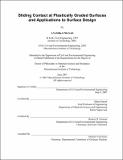| dc.contributor.advisor | Subra Suresh. | en_US |
| dc.contributor.author | Prasad, Anamika, 1979- | en_US |
| dc.contributor.other | Massachusetts Institute of Technology. Dept. of Civil and Environmental Engineering. | en_US |
| dc.date.accessioned | 2007-10-22T16:32:05Z | |
| dc.date.available | 2007-10-22T16:32:05Z | |
| dc.date.copyright | 2007 | en_US |
| dc.date.issued | 2007 | en_US |
| dc.identifier.uri | http://hdl.handle.net/1721.1/39260 | |
| dc.description | Thesis (Ph. D.)--Massachusetts Institute of Technology, Dept. of Civil and Environmental Engineering, 2007. | en_US |
| dc.description | This electronic version was submitted by the student author. The certified thesis is available in the Institute Archives and Special Collections. | en_US |
| dc.description | Includes bibliographical references (p. 147-156). | en_US |
| dc.description.abstract | Tailored gradation in elastic-plastic properties is known to offer avenues for suppressing surface damage during normal indentation and sliding contact. These graded materials have potential applications in diverse areas such as barrier coatings for structural components and industrial tools. The gradient in plastic properties is of greater significance for such tribological applications due to the higher level of plastic strains. However, no systematic study exists to predict the impact of plastic gradients for such abrasive events. Such a study is required, both for a fundamental understanding of the plastic gradient effects, and for a practical requirement of the design of graded surfaces. In this work, the effects of the plastic gradient on the surface deformation and hardness response are investigated through systematic experiments and simulations of the scratch test. For the case of the linear increase in the yield strength, some of the fundamental questions related to the mechanism of behavior are addressed, and its implications in the design of graded surfaces are discussed. Through derivation of dimensionless functions, a simple framework is developed to predict the scratch test response of such materials. | en_US |
| dc.description.abstract | (cont.) A model plastically graded nanostructured Ni-W alloy is chosen for the experimental evaluation. In this material system, a linear increase in yield strength is introduced through a gradually decreasing grain-size with depth, based on the classic Hall-Petch effect. By recourse to the indentation and scratch tests, the effects of the gradient on the contact deformation response of the material are investigated and the results are compared with the numerical simulations of the same. A close agreement between the two studies demonstrates the applicability of the earlier design guidelines for such materials. Thus, the simulations and the experiments give valuable insight into the mechanics of plastically graded materials, and identify practical guidelines for the design of damage resistant surfaces. | en_US |
| dc.description.statementofresponsibility | by Anamika Prasad. | en_US |
| dc.format.extent | 171 p. | en_US |
| dc.language.iso | eng | en_US |
| dc.publisher | Massachusetts Institute of Technology | en_US |
| dc.rights | M.I.T. theses are protected by copyright. They may be viewed from this source for any purpose, but reproduction or distribution in any format is prohibited without written permission. See provided URL for inquiries about permission. | en_US |
| dc.rights.uri | http://dspace.mit.edu/handle/1721.1/7582 | |
| dc.subject | Civil and Environmental Engineering. | en_US |
| dc.title | Sliding contact at plastically graded surfaces and applications to surface design | en_US |
| dc.type | Thesis | en_US |
| dc.description.degree | Ph.D. | en_US |
| dc.contributor.department | Massachusetts Institute of Technology. Department of Civil and Environmental Engineering | |
| dc.identifier.oclc | 173619801 | en_US |
